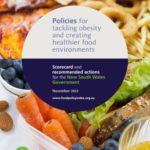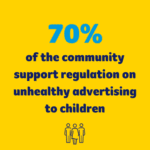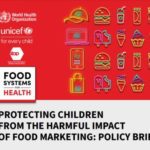Category: Research

What has the NSW government been doing to address obesity rates? Not enough according to the latest scorecard from Deakin University researchers. The NSW scorecard The researchers asked experts to rate how governments are going on 28 policies that are recognised worldwide as actions needed to address obesity. New South Wales scored low or very […]

Magda’s Big National Health Check was recently on ABC television. The 3-part series explained how the availability, promotion and pricing of highly processed foods make it hard for us all to eat well. Episode 1 highlighted how our kids are being bombarded with unhealthy food and drink advertising. Dr Sandro Demaio explained ‘the cards are […]

Government action on policies to deal with food marketing is more likely if the community is also behind it. Cancer Council has been asking the NSW community about their support for certain government actions every three years since 2013. The findings Our 2022 survey found that 70% of the community want children protected from unhealthy […]

Young people see 168 unhealthy food ads through social media in a week; that is 17 promotions for food and drink every hour they are online. And unlike passively watching a television commercial, these ads are especially devious. They look like they are endorsed by peers in their social network or from other social media […]

The World Health Organization and the United Nations Children’s Fund have released a policy brief on options to increase the protection of children from the impact of food marketing. This brief adds to the already large number of publications produced by WHO that build on the evidence base. What should policy look like? The brief […]

Childhood obesity is a serious problem in NSW because it affects children’s health and wellbeing now and into the future. Projections into future health costs show that obesity and connected diseases such as cancer will be a major contributor to those costs. Obesity prevention The NSW government invests in addressing obesity in many ways, including […]

Advertisers are bombarding our kids with unhealthy food ads and the only protection for them is flimsy Codes written by the food and advertising industry themselves. Children’s exposure to high levels of unhealthy food marketing affects the food and drinks that they like, ask for, buy, and consume. Except for ‘C’ and ‘P’ rated TV […]

Early results suggest Chilean food marketing policy is reducing children’s exposure to junk food ads. In 2016, Chile introduced a policy to restrict child-directed marketing of unhealthy foods and beverages. A study has looked at 12-14 year old’s exposure to ads that were high in energy, total sugars, sodium, or saturated fat and their consumption of unhealthy foods before and after the policy implementation. It found that the policy has reduced […]

Social media posts are always competing for our attention, and it seems that was no different for food, beverage, and alcohol companies during the COVID-19 pandemic. Australian researchers found that, over a four-month period in 2020, food and alcohol companies incessantly marketed their brand using COVID-19-related themes about isolation activities (e.g., what to do while at home) or community support, such as the following post “Connect with your mates online and we’ll get through this together, […]

Most Australian high school students see food or drink advertising on social media at least weekly and those students are more likely to have a high intake of unhealthy food. In this Cancer Council funded National Secondary Student Diet and Activity survey, students who reported seeing a food or drink advertisement on social media at least weekly – about a quarter of students – were even more likely to have a higher intake […]
